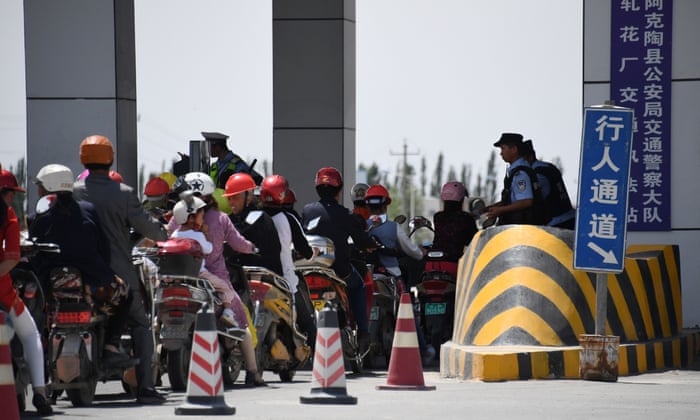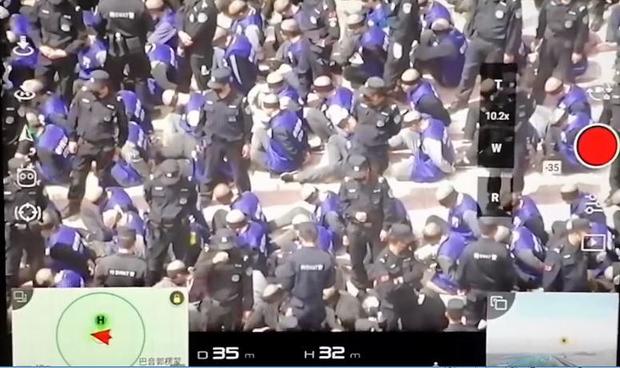Beijing's Education Camps in Xinjiang
"There has not been a single case of violent terrorism in the past three years."
"The education and training centers [where a million Turkic Uighurs are incarcerated] are schools that help the people free themselves from terrorism and extremism."
Wang Yi, Chinese Foreign Minister
"Many, many governments are looking the other way and self-censoring on the issue of Xinjiang."
"Few countries are willing to find themselves on the receiving end of Chinese retaliation."
Daniel R. Russel, former U.S. administration official
"If you can't get a discussion on Syria [at the United Nations Security Council] after all these seven years of brutality, of course you can block a discussion on Xinjiang."
Zeid Ra'ad al-Hussein, human rights official, United Nations
 |
| A police checkpoint near a facility believed to be a re-education camp where mostly Muslim ethnic minorities are detained in China’s Xinjiang region. Photograph: Greg Baker/AFP/Getty Images |
Ten years ago Turkey's Recep Tayyip Erdogan spoke of the Uighurs in China as suffering from "simply put, genocide", referring to their precarious position with the government of China. His point of view has undergone quite a massive change; silent now, the voice of his overwhelmingly Islamist country on the mass incarceration and re-education and forced assimilation of over a million Turkic Muslims in the western region of Xinjiang, China.
His is not the only voice that has been silenced by self-interest. China's vast network of detection camps and its systematic surveillance as the state operates to convert Uighurs to loyal supporters of the Communist Party is well known and silently deplored. Few influential voices are raised in protest, in support of the Uighurs, left to their fate within China. Diplomats, witness to the problems condemn China privately, but publicly it remains a non-issue.
Muslim countries in Africa, Asia and the Middle East have all been silenced. They have too much to gain by supporting China, and much to lose by any discussions highlighting China's persecution of Xinjiang Muslims at the United Nations. And nor did President Donald Trump, hosting a special event before the recent General Assembly on protecting religious freedom, mention the Uighurs.
The Organization of Islamic Cooperation at the United Nations, a powerful bloc, has done or said nothing to disrupt its good relations with China. Why rile the dragon when China speaks of the state-mandated detention camps surrounded by high walls to be central to its battle against Islamist extremism? These are mere boarding schools where detainees, voluntarily signing in to them, are the beneficiaries of educational opportunities to become faithful Chinese citizens.
Visiting Beijing soon after the 51 deaths of Christchurch Muslims, New Zealand's prime minister, Jacinda Ardern whose country sells much of its main exports -- milk, meat and wine -- to China, had nothing whatever to say in public, but mentioned a private discussion with President Xi Jinping over Xinjiang. As for Turkey's compliance, a $3.6-billion loan China helped it to secure for energy and transportation made for happy bedfellows.
In Geneva in the summer, close to two dozen mostly Western countries including Japan, signed a joint call to China to close the camps, presented at the UN Human Rights Council. None of the involved countries was willing to be recognized as the organizer; the signers leaned on a procedure allowing the petition to be circulated without identifying a principal leader.
China's response was to prepare a counter-group of 37 nations most friendly to China who were quick to praise China's "contribution to the international human rights cause". In the interim, Beijing invites select guests to attend circumscribed tours of the detention camps, to impress them with the necessity to engage in positive publicity through these hand-picked visitors including journalists. But there are exceptions.
"I have previously raised Australia's concerns about reports of mass detentions of Uyghurs and other Muslim peoples in Xinjiang."
"We have consistently called for China to cease the arbitrary detention of Uyghurs and other Muslim groups. We have raised these concerns — and we will continue to raise them — both bilaterally and in relevant international meetings."
Australian Foreign Minister Marise Payne
 |
Labels: China, Condemnation, Uighurs, United Nations, Zinjiang

<< Home